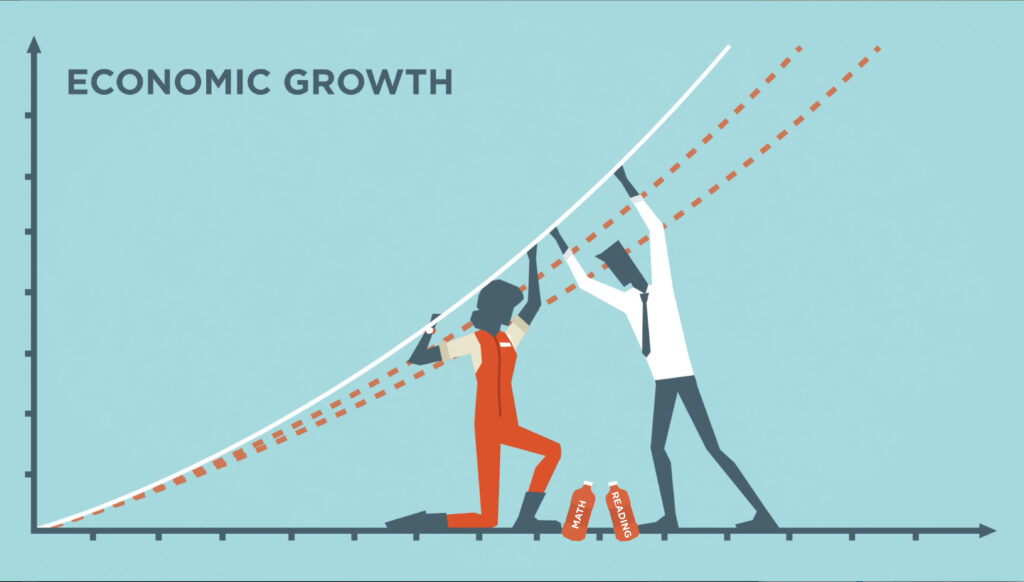
what is education?
Education THE word "education" comes from the Latin edu, meaning to bring out or lead forth. It has more to do with the education in a logical manner as it also includes formal forms of teaching and learning, such as lectures but this type is usually undertaken by pedagogy teachers or tutors who only focus on one specific level of learners. Education is the transmission of information, critical thinking and social or personal skills.
How does education empower individuals?
Education is a potent instrument that molds people by giving them possibilities for development, knowledge, and skills. But how precisely does education provide people more power? Let us examine its main advantages:
1. Developing Critical Thinking and Learning
Education gives people the knowledge they need to comprehend the world in which they live. It fosters critical thinking skills, which aid in situation analysis, issue solving, and well-informed decision making. Critical thinking skills enable people to confidently face life's obstacles.
2.Strengthening Self-Belief
People are more confident about their own skills when they have learned how to do something and overcome obstacles. Self-efficacy (the belief that one can perform successfully) is created when people are given the tools to take advantage of new opportunities, not back down from challenges and pursue their goals.
3.Producing Possibilities
With education comes new opportunities. It leads to social mobility and better employment opportunities, which ultimately boosts the income. Formal education-people making choices and having better life for themselves/their families through the empowerment of learning certain skills.
4.Promoting Social-Emotional Learning
Through education it is learnt the social & emotional competencies like empathy, collaboration and open communication. These are the skills required to form relationships, cooperate with others and become a productive member of society. Facilitating people in purpose and passion detection, education helps them to grow as a person5.Advocacy and Leadership Related Posts
Furthermore, education empowers the public to hold leaders accountable and advocate for change. In addition, people are less likely to address the problems of their communities when they do not have knowledge about social issues and global more broadly. Rightly so, people who have higher education levels will always be better placed at impacting our society for the right way.

Why education important for economic growth?
Human capital, productivity, innovation or opportunities (for people and nations) for economic progress provides four purposes behind importance of education in an economy. This is where education comes into within:Build knowledge and Skills: Education provides people with the information, and skills needed to be productive in many different fields. A capable workforce paves the way for higher economic production.
Enhances Innovation and Productivity : A staff with higher levels of education is better equipped to innovate, use technology, and improve procedures. Through the introduction of new products, services, and industries to the market, this is what propels innovation and ultimately economic growth.
The demand for trained labor is constantly high in most enterprises, thus countries with literate workers will appear attractive to foreign investors. More foreign investment results from this, which boosts GDP and generates jobs.
In addition to this, poverty and inequality are being reduced because it affords the opportunity for better-paying jobs (only achieved through a better education. Thus, more tax revenues and higher consumer spending boost the economy.
It improves health and well-being. The degree of education will increase higher levels of working productivity, hence reducing health care costs. A better educated population will lead to a more civilized society. It enhances the life skills. Our health is a robust national economy.

What does the future holds for education?
Innovations in the education sphere are being shaped by technological developments, changing needs in society, and evolving global challenges. Through glancing into the future, trends and innovations in the education sphere may make the education system more accessible, personalized, and sensitive to a fast-changing world. Here's a peek into what the future holds for education:
1. Digital and Hybrid Learning
The change in the face of education has already started with technologies associated with digital platforms and online learning tools. What the future holds is even more integration of these learning models, whether online or hybrid, to give a lot of flexibility and choices to acquire knowledge from any place at any time. Hybrid models combining online with in-person will prevail in many educational institutions as it offers greater flexibility and gives an experience personalized for learners.
2.
Personalized and Adaptive Learning
Again, the revolution will move toward focusing more on student-centered and personalized education. AI and
data analytics will empower instructors to make their instruction more
personalized for each student, matched to the specific learning preference,
pace, and strength of that learner. Adaptive learning technologies
will change the difficulty and speed of the content
in real time, according to a student's performance. This will
allow them to learn more appropriately to their
own speed.
3. Lifelong Learning and Micro-credentials
The ever-changing job market will be accompanied by a
rising need for lifelong learning. People will continue to update
their skills to fit the growing technological advances and
changing industries. Traditional degrees will no longer denote expertise as professionals continue to grow through
micro-credentials, short courses, and certifications. These internet platforms, including Coursera,
edX, and Udemy, already transform the face of this
shift in the learning arena, by providing low-cost and
low-pound-formula education options in small packet sizes.
4. Skills over Degrees
Degrees will not get as much focus in the future education system as skills will. Increasingly, employers are interested not in the degree but in the people who think, apply themselves, solve problems creatively, and can work with others; and the academic classroom is not always the place to learn those things. The institutions of learning will have to adjust to the demand by focusing on project-based learning, vocational training, and so forth-preparing students to apply what they have learned in the real world.
5. Innovation incorporating Emerging Technologies
Artificial intelligence, virtual reality (VR), augmented reality (AR), and blockchain are incorporated in education. For example :
Virtual and augmented reality allows the students to immerse into interactive and hands-on learning, especially areas like medical science, engineering, and history.
AI tutors will help the students with learning customized for them with real time facilitation and feedback.
Blockchain technology will be safely implemented to deter fraud claims regarding academic credentials, and simultaneously, an efficient method for the enrollment process.

